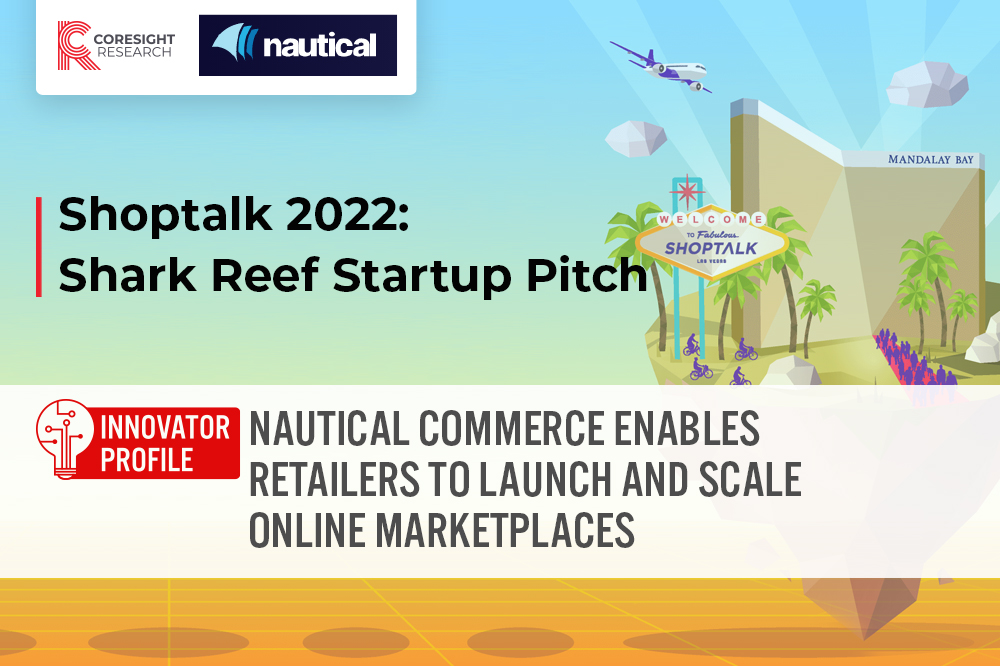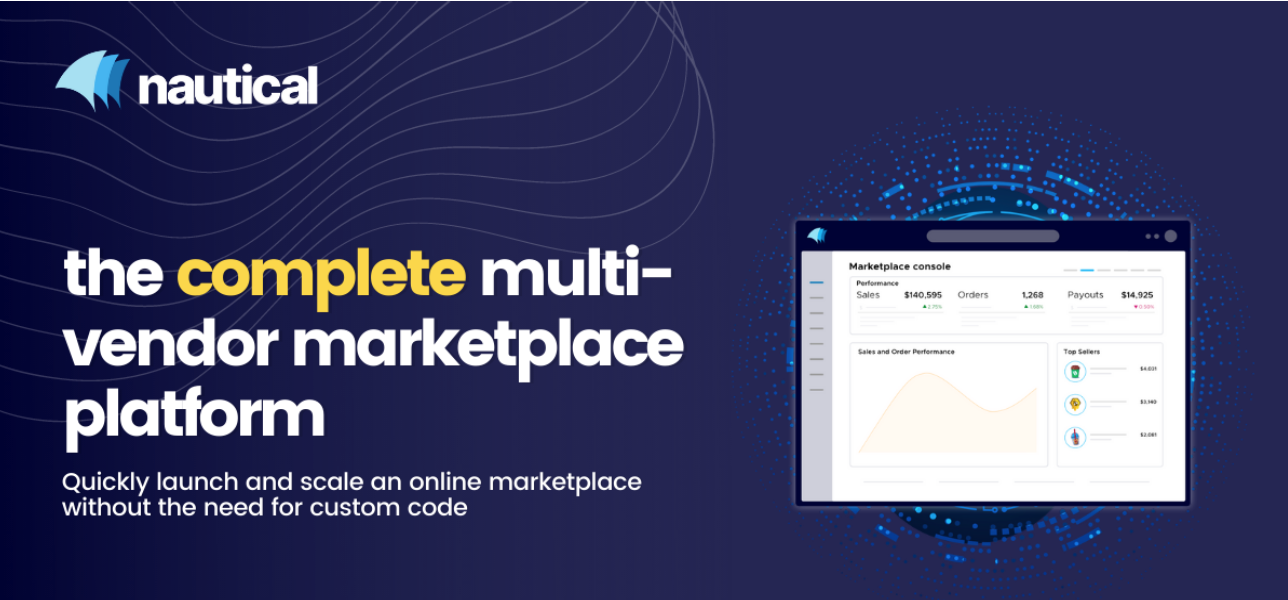
albert Chan
Introduction
What’s the Story?
The Coresight Research team will attend and participate in this year’s Shoptalk conference, which will be held on March 27–30, 2022, in Las Vegas, US. Shoptalk 2022 will address the sudden transformation in the retail environment since the outbreak of Covid-19, as the industry is looking to embrace technology and innovation to address new challenges.
On March 27, 2022, Deborah Weinswig, CEO and Founder of Coresight Research, will emcee and feature on the judging panel of Shoptalk 2022’s “Shark Reef” startup pitch competition, which will see 15 early-stage US retail-technology innovators compete to win the Shark’s Choice and Audience Choice awards. In the lead-up to the event, we are profiling the participating innovators.
This report forms part of our Innovator Profile series, which focuses on emerging technologies that are disrupting traditional retail and fuelling innovation across the retail value chain. We present Nautical Commerce, a retail-technology company that offers a multi-vendor software-as-a-service (SaaS) platform. Coresight Research collaborated with Nautical Commerce to offer insights into its service capabilities and offerings.
Why It Matters
Coresight Research categorizes the 15 participating innovators into four areas of disruption in retail. Nautical Commerce falls under “ground-breaking digital commerce.” As advances in innovative technologies, such as artificial intelligence and machine learning, transform automated capabilities within retail, digital commerce is set to grow rapidly in functionality and popularity. Technology innovators focusing on ground-breaking digital commerce can assist retailers in marketing automation, social media campaigns, business analytics, order management and more.
Nautical Commerce: In Detail

Headquarters
New York, New York, US
Funding Stage
Series A Funding stage
Company Description
Founded in 2020, Nautical Commerce is a retail-technology company that offers a multi-vendor SaaS platform. The end-to-end platform uses a headless-commerce structure, and enables both business-to-consumer (B2C) and business-to-business (B2B) brands and retailers to rapidly launch and scale online marketplaces. Headless commerce refers to an e-commerce platform structure that separates the front and back ends to enable the editing and updating of either end independently.
Users can create a marketplace with multiple vendors and import their existing catalogs by using API (application programming interface) access and integrations with e-commerce websites such as Shopify. The platform’s headless-storefront structure enables vendors to quickly adjust the front end of their digital store to adapt to the latest consumer trends, implement new marketing ideas or utilize the latest e-commerce software without extra overhead costs.
Nautical Commerce aims to offer B2B and B2C e-commerce businesses a low-maintenance and cost-efficient way to launch an online marketplace that is easy to change and customize as consumer shopping trends evolve and new e-commerce software emerges.
[caption id="attachment_143615" align="alignnone" width="700"] Source: Company website[/caption]
Source: Company website[/caption]
What Problem Is the Company Solving?
As more consumers adopt digital shopping, e-commerce platforms and other digital systems are becoming more interconnected. However, building online marketplaces can be a complex, expensive and time-consuming process due to the broad technology stack and many developer hours often required to build out the front and back ends of an online marketplace. This is particularly ill-suited to the fast pace of e-commerce, as consumer shopping patterns and trends can change rapidly, requiring the front end of the marketplace to be flexible and adaptable.
According to Nautical Commerce, by using a platform with a headless-commerce storefront structure, retailers and entrepreneurs can leverage a full technology stack that can integrate with many digital systems, creating a seamless online marketplace. Through self-service tools, powerful APIs and a flexible front-end structure, the platform can accommodate numerous self-supporting vendors, which can access the newest e-commerce software and adapt to the latest consumer trends without affecting the core back end of the marketplace. This solution thus takes away much of the costs and complexities associated with e-commerce, Nautical Commerce states.
Market Opportunity
Emerging technologies and integrations between digital platforms are transforming e-commerce and fueling its growth, as the number of online marketplaces increases. We estimate that total online retail sales (excluding automobiles) reached $805 billion in the US in 2021 and will total $1.2 trillion in 2025, representing a CAGR of around 10%. Key growth drivers will include emerging technologies, such as artificial intelligence and machine learning, as well as the rise of social commerce, particularly among younger consumers.
As more consumers shop digitally, B2C and B2B retailers and brands will look to utilize online marketplaces that harness advances in e-commerce technology to keep up with major players like Amazon and Target. Coresight Research’s March 7, 2022, US consumer survey found that over half of respondents are continuing to avoid public places due to the pandemic—driving traffic to online marketplaces. According to Statista, the top three online marketplaces in the US saw a combined total of just over 3 billion monthly visits as of April 2021. This underscores the opportunity for brands and retailers to expand their online presence and participate in the digital e-commerce ecosystem.
What We Think
We believe that more online marketplaces will emerge as e-commerce grows in popularity. E-commerce platforms will become more interconnected to facilitate a more seamless digital shopping experience. Retailers can look to advances in retail technology, such as headless-commerce digital storefronts, to cater to fast-changing consumer shopping patterns and enhance the digital shopping experience.